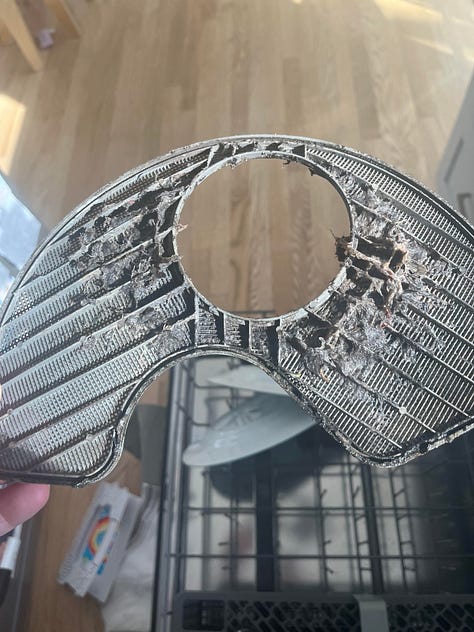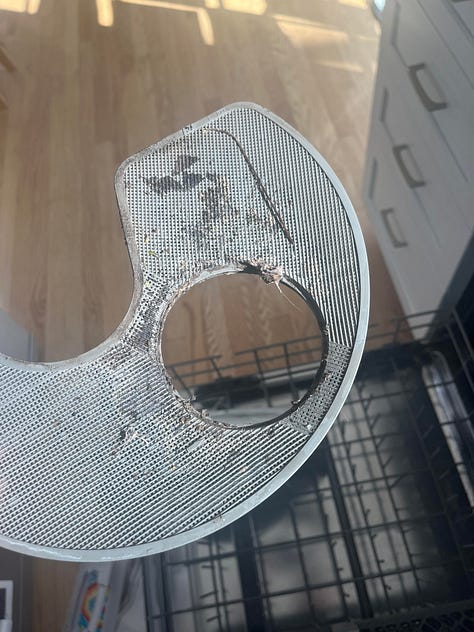Cleaning the Things We Use to Clean Things
You ever thought about cleaning a toilet brush??
Jolie,
You’ve disappeared from social media (understandably) but I’ve been thinking about you and wondering how you’re doing. But now I have an excuse to email you. As it turns out, the dishwasher that came with our house requires regular cleaning! Who knew? Seems counterintuitive to clean the thing that cleans.
I’ll apologize because I forgot to take a picture of the round filter thingy before emailing you. It was truly foul and you would have loved it. But I’ve attached a picture of the flat filter and a paper towel for after I wiped once in the filter area.



Anyway, I’m cleaning it out and I wanted to ask you if it’s a good idea to dump some white vinegar inside the machine and just run it. Is that dumb?
When I launched Ask a Clean Person: The Newsletter, I told a handful of friends but otherwise didn't make any sort of announcement about it — my attitude is that it's something I'm doing for fun, not for money or attention or etc. etc. etc., and that My People would find me.
And, indeed, My People have found me — this query comes from a Deadspin-era reader, who emailed me out of the blue with a very good question about cleaning the things we use to clean. It definitely is counterintuitive that we have to clean the things we use to clean, but we most certainly do! Major appliances like dishwashers and washing machines require routine maintenance to ensure optimal cleaning and safe operating; similarly, the tools used for cleaning, including everything from rags, mop heads, and vacuums to, yep, toilet brushes also need to be cleaned to prevent cross-contamination.
One day we shall talk about cleaning a toilet brush, but today is not that day. Because today we need to talk about cleaning a dishwasher! What fun!!!
How Often to Clean a Dishwasher
Experts recommend cleaning a dishwasher once a month. If you live in an area that has hard water, your dishwasher may need to be cleaned more often to keep mineral deposit buildup at bay.
If you're reading this like, "Once a month are you crazy?!?" I get it. I'm obligated to tell you the expert-approved answer but then also, since this is my space to do with what I want, I'm going to trot out one of my favorite AaCP tropes and remind you that I live here in the real world with the rest of you and I know no one is cleaning their dishwasher twelve times a year. I'm certainly not!
So! If you're human and/or not a super schedule-y person, you can certainly clean the dishwasher filter on an ad hoc basis; this is the approach I take, and I find that the Sniff Test is the correct quantifier that tells me it's time to degunk (technical term) the filter. Which is to say: When the dishwasher smells, I take out the filter and clean the thing. Another good approach would be to clean the dishwasher two to four times a year. In the spring and after the holidays? Sure! At the changing of the four seasons? Also a great approach!
How to Find Your Dishwasher's User's Guide or Manual
Before we get into how to clean a dishwasher, a quick note on user guides and manuals. It's worth taking the time to find the user's guide because it will tell you where certain parts are, and how to remove them. If you do not have the physical user's manual for your dishwasher or any other major appliance in your home, Google the brand name+"user's manual" to find it; if you know the model, great, but if not, don't sweat it: You should be able to pretty easily identify, based on the design elements, which search result corresponds to your machine.
For example, when my dishwasher filter took on a bit of a smell, I Googled "whirlpool dishwasher manual," because the only thing I knew was that I have a Whirlpool dishwasher, and that was enough to help me find everything I needed to locate and remove the filter for cleaning.
If you're a visual learner, you can search for instructional videos instead of written user manuals. Most major manufacturers offer instructional videos on their websites or social media channels.
In the case of dishwashers, you'll want to know where the filter is and how to remove it from the unit for cleaning. The manual will also tell you if the spray arms can be removed to facilitate deeper cleaning. You'll also find information about what not to do, which can help you avoid costly or irreversible damage.
How to Clean a Dishwasher
The hardest thing about cleaning a dishwasher is remembering to do it in the first place. If you can wash a dish and run a dishwasher, you can clean this household appliance. Here's how:
Step 1: Clean the Filter
Start with an empty dishwasher.
Pull out the bottom rack and remove the filter from the bottom of the unit; if you're unsure where the filter is located and/or how to remove it, check the manufacturer's instructions for guidance.
After removing the filter, use a paper towel to clean out anything trapped the bottom of the unit, including and especially any visible food. Then, wash the filter itself using hot soapy water. Rinse it well and return it to the dishwasher.
Step 2: Clean the Spray Arms and Seals
Next, clean the spray arms and the seals using a damp cloth with a small amount of dish soap.
If there is debris stuck in the spray arms, use a toothpick to dislodge it. In some models, the spray arms can be removed to make deep cleaning easier; the user's manual will have that information and instructions on how to remove and reinstall the spinner arms.
Step 3: Clean the Entire Unit with Dishwasher Cleaner
Once the filter and spray arms have been deep cleaned, return them to the unit and run a regular cycle with a dishwasher cleaner to flush the entire appliance. Using a dishwasher cleaner will clean parts of the machine that you cannot see or reach, including the tub, racks, the pump and valve system, and the drain and recirculation hoses.
There are some options here! You can use a dishwasher cleaning tablet (fun!) orrrrrr you can use our old friend white vinegar. (Have you missed our old friend white vinegar? BHG had me write about things not to clean with white vinegar and it hurt my heart so deeply to have to do that to our old friend!) Both work equally well; dishwasher tablets have the benefit of working in an empty or full dishwasher, but it is a single use product that is expensive — a pack of six dishwasher tabs costs about $9! — while vinegar is cheaper and multi-use, but it should only be used in an empty machine. White vinegar will also not be the best choice if you are diligent about cleaning your dishwasher monthly, because — and this is according to me, lol, from that BHG article, "Prolonged or repeated exposure to vinegar can cause rubber parts like gaskets and hoses to disintegrate. Check the manufacturer's instructions before cleaning household appliances like washing machines, refrigerators, or dishwashers with vinegar to be sure that the type of rubber used in those machines can be safely exposed to vinegar."
Cleaning a Dishwasher with a Tablet
Dishwasher cleaning tablets can be used in an empty or full dishwasher. To clean the machine with a load of dishes, place the tablet in the bottom of the unit; to clean it while empty, place the tablet in the detergent dispenser. If the dishwasher has significant buildup, put one tablet in the detergent dispenser and a second in the bottom of the unit and run a cycle without dishes.
Cleaning a Dishwasher with White Vinegar
White vinegar should be used in an empty dishwasher to avoid damage due to overexposure to the acids in vinegar. To use white vinegar to clean a dishwasher, place a cup or bowl with one cup of white vinegar in the top rack of an empty dishwasher, and run a normal cycle. (A measuring cup is the ideal vessel for this procedure, but anything that will hold one cup of vinegar will do!)


When it comes to cleaning cleaning things, I don't mind cleaning the dishwasher, but I really resent cleaning the vacuum.
1. I am so happy to have found you here! Love(d) your podcast!
2. I can’t stop thinking about the toilet brush, which I’m ashamed to say I’ve never before thought about cleaning. How???